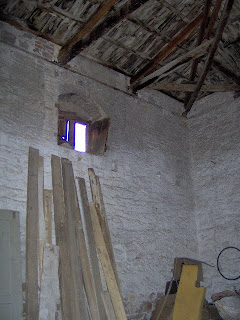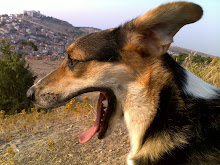When a new planet swims into his ken;
John Keats
The problem I have always had with Keats’ poem ‘On first looking into Chapman’s Homer’ is Stout Cortez. I imagine him, red-faced and dangerously overweight, stuffed into an uncomfortably tight leather tunic, not standing up straight on the peak in Darien for that first magical glimpse of the Pacific Ocean, but bending over, wheezing and gasping for breath after the exertion of getting up there, and quite unable to appreciate the view.
Keats was, of course, using the word ‘stout’ in a different sense to the one above, but there's no helping it: for me, the image of Stout Cortez will always be that of John Prescott in a Conquistador’s uniform. And looking at portraits of Cortez, that image doesn't seem too far from the truth.
Nevertheless, the poem does convey vividly the idea of the life-changing moment: when, quite without warning, you come upon a person or place or idea that alters everything, and the boundaries of your previous world slip and slide in an instant, opening up new, and previously quite unthought of, horizons. For me, that moment came on a sunny day in January 2007, when I walked into a camel barn in Ayvalık, a town on the north Aegean coast of Turkey.
I first came to Ayvalık quite by chance, when I was teaching at a university in the Turkish capital, Ankara, and thinking of buying a house in Turkey. A Turkish friend suggested that I should consider Ayvalık, a town famous for its beautiful location on the Aegean coast, surrounded by islands, for its Ottoman Greek architecture, and for its delicious golden olive oil. We came to Ayvalık for a weekend, and from the moment I first saw the town, I never considered buying a house anywhere else.
Ottoman Greek, in terms of architecture, refers to houses built before 1923, (when the Ottoman Empire came to an end and was replaced by the new Turkish Republic) by the Orthodox Greek Christians who were the principal occupants of this part of Asia Minor under the Ottoman Empire.
Many of the houses in Ayvalık are built in the style of the Greek neo-classical revival - square stone boxes, with pediments - like the one in the photograph on the right, which belongs to my next door neighbour N, one of Turkey's most famous rock stars (and also an architect).
 Others are built in the traditional Ottoman style, with an overhanging upper storey, giving them a slightly mediaeval air, although the town is only about 400 years old: it was founded by people looking for a safe place to live on the mainland, to escape from continual pirate raids on Lesbos (which lies just off-shore) and other Aegean islands.
Others are built in the traditional Ottoman style, with an overhanging upper storey, giving them a slightly mediaeval air, although the town is only about 400 years old: it was founded by people looking for a safe place to live on the mainland, to escape from continual pirate raids on Lesbos (which lies just off-shore) and other Aegean islands.The old town in Ayvalık contains just under 2,000 Ottoman Greek houses, in varying states of repair from fully restored, like this:
to falling down - literally- like this:
The house I ended up buying, with its attached camel barn, was somewhere in between, but was distinguished by being one of the most hideously modernised houses in Ayvalık. The picture of the house on the estate agent's web site looked deeply unpromising. It was 100 years old, but you wouldn't have known it: in a town full of beautiful swans, this house was a serious ugly duckling:
I only went to see it because there was some kind of stone 'studio' in the garden, and I was looking for somewhere containing at least one really big room, to house all my books. The inside of the house turned out to be much, much better than its dispiriting exterior. As it stood on a corner, there were many windows, and the house was filled with light. The rooms were large, with high ceilings. Although most of the original features had been removed, there remained one tall, typically Greek, extravagantly-pedimented cupboard, which alone almost justified buying the house:
The 'studio' turned out to be this, the sad skeleton of a once lovely stone building, the windows and doors long gone, and the massive stone walls coated with whitewash:

















I am loving this story....
ReplyDelete"John Prescott in a Conquistador’s uniform" - lmfao.
ReplyDeleteHocam, no matter how many times I read/hear your story, it always makes my heart soar. May I stumble upon my library one day..
hahahahaha - the word verification thingie said 'tacks' :D
ReplyDeleteHi. I'd love to see the library as it is today!
ReplyDeleteI love this. It's walking through your life before I knew you, with added Turkish history. I am so glad you picked it back up. xoxo
ReplyDeletePueblo girl - there will be photos on the blog in due course, but not for a while, as I'll be writing about the renovation in chronological order, interspersed with other stuff.
ReplyDeleteIn the mean time,if you look here
http://twitpic.com/3q64z
there is a photo of the finished camel barn interior, and there are some other photos of the house and courtyard there on twitpic as well.
justme - thank you. I hope you will continue to read it.
sonja - thank you, I think! 'However often I hear your story..' does rather bring to mind the Ancient Mariner..
Artichoke Queen - thank you. I want you to know there will be pictures of artichokes at some point, just for you.
I hadn't realised how close you are to the island of Lesbos. Have you seen Armand Leroi's documentary 'Aristotle's Lagoon'?
ReplyDeleteI mean it - it's a truly inspiring story.
ReplyDeleteSonja - thank you, hocam
ReplyDeleteDHM Yes, I just have to walk up the hill from my house to get a very fine view of Lesbos:
http://www.blipfoto.com/view.php?id=506672&month=3&year=2010
I haven't seen the documentary, unfortunately, but would love to, as I am a big fan of Aristotle, & find him infinitely preferable to Plato. His ideas about biology, and the place of humans in the great scheme of things, were extraordinarily prescient.
I have made a pilgrimage down the coast to Assos, though, which is quite close to Ayvalik, and is the place where he founded his academy.
Wow, cool! (re: your last line)
ReplyDeleteA pilgrimage to Assos is something I need to add to my little list.
ReplyDeleteI came to Aristotle relatively late in life. I had often wondered why some friendships endure and some do not, and discovering that all this had been beautifully explained over two millennia ago made me at once rejoice in the discovery and regret the years of painful ignorance.
Now—as someone whose childhood faith did not endure—I find the question “OK, what would Aristotle do?” to be the closest I can get to a prayer.
DHM - could you please tell me which of Aristotle's texts discusses friendship? This is something I'm exploring in my own life right now and would really appreciate some ancient wisdom..thanks..
ReplyDeleteSonja Tack – Nicomachean Ethics books 8 & 9. The section I was thinking of when I wrote the comment above is in book 8 and deals with Aristotle's three categories: friendships of utility, friendships of pleasure, and friendships of the good. Reading it changed my life for the better, I hope it can do the same for you.
ReplyDeleteThank you so much!! Adding it immediately to my summer reading list..
ReplyDelete...and it's available in our university library, thanks again.. :D
ReplyDeleteHappy Hocam
my own yogurt-making recipe:
ReplyDeleteSo I get a kilo or so of milk from İbrahim the milk man, heat it to a boil, then let it cool til I can stir it with my finger for 12 seconds. Then I add a few tablespoons of yogurt, put the mixture on top of the fridge and voila, afiyet olsun.
Okay, not as fun as catching your own sheep, but more feasable within town limits...
thanks for the informations
ReplyDeleteAs soon as I saw your blog title a couple of weeks ago I thought “Take my camel, dear, said my aunt Dot, as she climbed down from this animal on her return from High Mass.” The precipitous opening of Rose McCaulay’s 'Tower’s of Trebizond’ both incredibly funny, impossibly sad and all too human, as must be your story of the Greek community. Your dedication, “to my Designated Reader: he knows who he is” added further timbre to the allusion.
ReplyDeleteI am certain you have a copy which will find eventual repose in the library. I envy you; many years ago I visited the late Julius Held in Vermont and saw his barn, ever since I have wanted my own. "Much have I travell'd .." also, and, as you, far from the native land. As I work my way through your story from the beginning, the base of this post describing your decision seems the most fitting place to insert the recollection.
@ Michael Robinson: I have always thought that that sentence is one of the best opening lines of a novel ever written... I do of course have a copy, although I would be hard pushed to find it right now, as although the barn is now restored, I have not yet organised and catalogued the books.
ReplyDeleteAnd yes, there is something about a barn: I have always wanted one, too, and it is the perfect space in which to make a library. And having wanted one for so long, I still can't quite believe that I actually own one. I thank my lucky stars every day, pretty much...